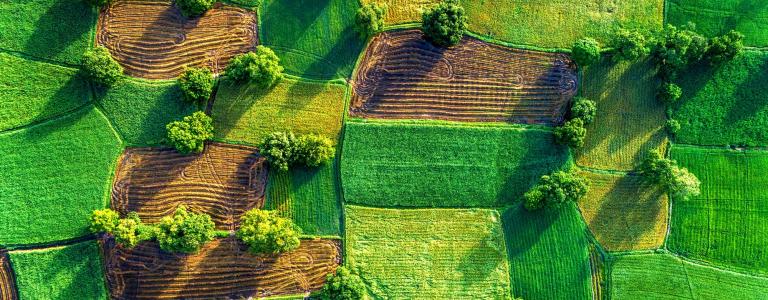Fair and Sustainable Trade in Food and Agriculture
IISD conducts research and facilitates dialogue to help bring about trade rules that promote equitable and sustainable international trade in food and agricultural products.
The rules that govern international trade in food and agricultural products influence what is grown, where, and how. This has implications for livelihoods and food security in developing countries and for the environmental sustainability of our food systems. However, negotiations on international trade rules too often take place in isolation from these broader public policy considerations.
We produce evidence and analysis to increase understanding of the links between agricultural trade rules and key sustainable development challenges facing low-income countries and vulnerable groups. We also provide a space for informed discussion among a wider set of actors—including those who have not traditionally been involved in talks on trade and markets.
Our work on this topic focuses on three main areas: influencing World Trade Organization (WTO) negotiations, promoting the reform and repurposing of harmful agricultural subsidies, and analyzing how voluntary sustainability standards can help make value chains more sustainable.
WTO Agriculture Negotiations
We aim to influence WTO negotiations to help bring about multilateral trade rules that promote equitable and sustainable international trade in food and agricultural products and support a more resilient and sustainable global food system. We do this by producing evidence and analysis, facilitating dialogue with WTO negotiators on how to design WTO rules that drive sustainable development, and supporting delegations from low-income countries to engage effectively in the negotiations.
Repurposing Public Support to Agriculture
Globally, governments provide over USD 850 billion a year in support to their agriculture sectors. Much of this support incentivizes unsustainable production and consumption patterns. It incentivizes farming practices that drive climate change, environmental damage, and biodiversity loss, threatening the sustainability of our food systems. It also promotes the consumption of unhealthy foods, driving worsening global nutrition and increasing obesity rates. We aim to help governments rethink how they support and subsidize agriculture, with a view to ensuring such support contributes to sustainable development objectives rather than undermining them.
Standards and Value Chains
Our State of Sustainability Initiatives program looks at the role that voluntary sustainability standards (VSSs) and associated initiatives can play in supporting more sustainable forms of production, consumption, and trade. Our work seeks to improve the design and practices of standards, increase synergies between standards and policy, and enhance transparency and accountability in value chains.
Publications and Events
Addressing Soil Acidity and Enhancing Soil Health
This policy report addresses the critical issue of soil acidity in the East African Community (EAC) and provides actionable recommendations for EAC partner states, the EAC Secretariat, and other relevant stakeholders.
Through Her Lens: Women leading change in sustainable agriculture and market inclusion
Despite the critical role that women play in agricultural production, they still do not have equal access to global agricultural supply chains on terms that benefit them.
Promoting the Development of Agricultural Cooperatives
Governments in the Global South should promote agricultural cooperatives to boost smallholder access to fair markets, finance, and climate resilience.
Stakeholder Consultation of the East African Organic Products Standard
This online event will bring together key stakeholders to review new standards, discuss regulatory requirements, and identify updates for relevant policies.
Project team

Steffany Bermúdez
Policy Advisor I

Facundo Calvo
Policy Analyst, Trade and Agriculture

Sara Elder
Senior Policy Advisor, Standards Workstream

Cristina Larrea
Director, Agriculture, Food and Sustainability Initiatives

Erika Luna
Policy Analyst

Claire McConnell
Policy Advisor

Florencia Sarmiento
Policy Advisor

Rupal Verma
Policy Analyst II

Sean Woolfrey
Lead, Sustainable Agriculture and Food Systems
Latest
You might also be interested in
Fisheries Subsidies
IISD works to support the WTO negotiations to end harmful fisheries subsidies.
Trade Knowledge Sharing
The nexus between trade and sustainable development is complex and multi-faceted, and ensuring that the conversation around these issues is active, engaged, and informed is vital.
What to Expect at MC12 From the Negotiations on Agriculture?
IISD’s Facundo Calvo discusses some of the likely outcomes of negotiations on seven key agriculture topics at the WTO’s 12th Ministerial Conference.
How Could Trade Policy Better Address Food System Shocks?
This report examines how trade policy can help governments anticipate and respond to food system shocks while avoiding harm to producers and consumers in other countries.

